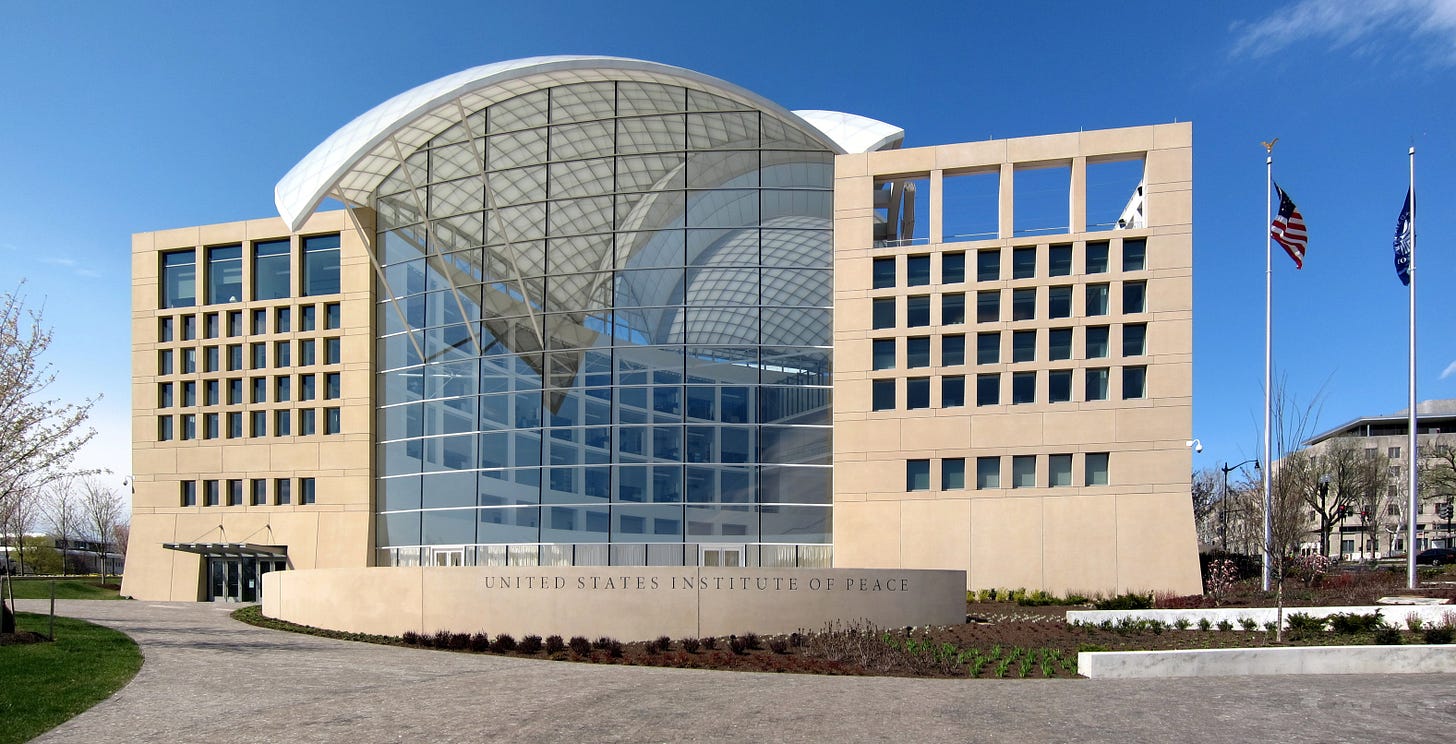A Nation at War with Peace
What the raid and takeover of the U.S. Institute of Peace reveals about who we really are.
Armed agents — FBI, police, private security, and officials from the White House’s DOGE — stormed the headquarters of the United States Institute of Peace (USIP) last week in a heavily armed, near-military-style operation. The irony is disturbing: a forceful raid on the only federal agency devoted exclusively to peace. There’s something almost mythic in its dark absurdity — the kind of scene peacebuilders are trained to prevent, not endure — and at the very home of the agency created to resolve conflict.
During a hearing that followed the takeover, U.S. District Judge Beryl Howell expressed strong dismay, calling the government’s actions “terrorizing” to employees who have long served this country.
Now, just days later, nearly the entire USIP staff has been eliminated and the building taken over. The move has sent shockwaves through the peacebuilding community. Decades of institutional wisdom, international trust, and hard-won experience were swept aside almost overnight.
This militarized takeover — and now, the near-total elimination of the agency through mass firings — are real-world acts with chilling metaphorical clarity, laying bare what this country truly values, and what it so easily discards.
Some context: USIP’s annual budget, much of it from Congressionally mandated federal funding, is around $55 million. Compare that to the recently increased U.S. defense budget: nearly $900 billion — more than the next ten military powers combined, and nearly half of all our discretionary spending. Peacebuilding, by comparison, gets not even pennies on the dollar.
What does this say about who we are, and what we truly value? The takedown of USIP couldn’t be a clearer example that peacebuilding doesn’t even come close.
This isn’t new. It’s not unique to one party or administration. Democrats have also consistently prioritized bloated defense budgets over the years — but, to be clear, they’ve also invested in peacebuilding, however modest those investments have been relative to the challenges we face. Importantly, they’ve supported institutions like USIP and USAID — and they’ve never launched the kind of unparalleled assault we’re now seeing from this administration.
We call it a defense budget. But much of what we fund defends little and destabilizes much. Consider Iraq and Afghanistan — just two of many tragic examples. These wars were framed as counterterrorism efforts, but instead created power vacuums, civil collapse, and surges in the very extremism they were meant to stop. The result? A world that feels less safe, not more.
Meanwhile, USIP was created to do the opposite. Its mission is to “promote research, policy analysis, education, and training on international peace and conflict resolution,” and to prevent and reduce violent conflict worldwide. It’s an imperfect organization, but they have done much work effectively in many global hotspots. The work of peacebuilding in general has always been underfunded, underrecognized — and is now under siege. President Trump’s executive order marked the agency for “expected termination.”
Peacebuilding work through USIP and agencies like USAID (also facing massive and unprecedented cuts) are critical investments we need to expand, not gut. (To be fair, both agencies also do work that I would not consider peacebuilding, in fact it can be counterproductive and at times damaging, but that is for another story. There is much important and good peacebuilding work happening that should not be completely shut down as it is right now).
Peacebuilding isn’t just idealistic — it’s smart policy. The Institute for Economics and Peace estimates that every $1 invested in peacebuilding saves $16 in future conflict costs.
So what exactly is being eliminated in the name of “efficiency”? Institutions that prevent violence, reduce suffering, and build long-term global stability — all while saving money. How is that efficient?
Liking what you’re reading? Hit “Subscribe” (it’s free!), stay connected to my work.
The raid on USIP is shocking, but it’s not just about one agency. It’s a flashpoint — a darkly symbolic moment that makes unmistakably clear our skewed national priorities. We fund the tools of war as if they’re sacred. We treat the tools of peace as expendable afterthoughts—or in the case of what is happening right now, with disdain.
We’ve seen this pattern play out domestically as well: funding for prisons and policing dwarfs that for violence prevention. We rely on force where we should be investing in care and building resilience.
Many are rightly outraged by the aggressive and counterproductive efforts now underway to dismantle agencies like USIP and USAID. But we should also see this as a wake-up call. This isn’t just about one administration’s bad decisions — it’s about a longstanding pattern of neglect and apparent disdain for the critical work of peacebuilding.
In finally resorting to such extreme force — and now the sweeping elimination of staff — to erase the very people working to prevent it, we’ve made one thing painfully clear: peace was never really our plan.
But it still could be.
Please take Action to Save U.S. Institute of Peace!
Write your elected officials using The Peace Alliance’s easy tool at: www.peacealliance.salsalabs.org/usip





